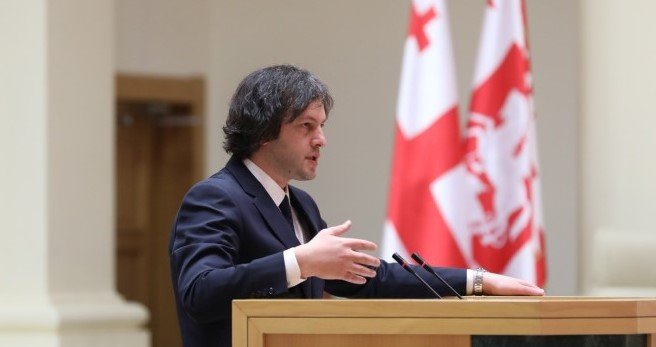Georgian Prime Minister Irakli Kobakhidze has recently criticized several non-governmental organizations (NGOs) and opposition parties, accusing them of pushing the European Union to suspend Georgia’s visa-free regime. According to Kobakhidze, these groups are promoting a political agenda aimed at punishing the Georgian people for their support of the ruling Georgian Dream party. This controversy has sparked significant debate within the country, highlighting the ongoing political tensions and the complex relationship between the government, NGOs, and opposition factions.
Political Accusations and Controversy
Prime Minister Kobakhidze’s accusations have stirred considerable controversy. He claims that certain NGOs and opposition parties are actively working against the interests of the Georgian people by urging the EU to reconsider Georgia’s visa-free status. This move, according to Kobakhidze, is a direct attempt to undermine the ruling party and its supporters.
The Prime Minister referenced a report by the McCain Institute, which suggested that the EU should consider pausing visa-free travel for Georgians. This report has been used by Kobakhidze to support his claims that NGOs and opposition parties are conspiring against the government. The allegations have led to a heated political debate, with various stakeholders weighing in on the issue.

In response, opposition leaders and NGO representatives have denied these accusations, arguing that their actions are motivated by a desire to hold the government accountable and promote democratic values. They assert that the government’s narrative is an attempt to deflect criticism and maintain its grip on power.
Impact on Georgia’s EU Aspirations
The controversy surrounding the visa-free regime has significant implications for Georgia’s aspirations to join the European Union. The suspension of visa-free travel would be a major setback for the country, affecting not only its citizens’ ability to travel but also its broader relationship with the EU. This issue has become a focal point in the ongoing political struggle between the government and its critics.
Kobakhidze’s statements have raised concerns about the potential impact on Georgia’s EU integration process. The Prime Minister has emphasized that the actions of NGOs and opposition parties could jeopardize the country’s progress towards EU membership. This narrative has been used to rally support for the ruling party and paint its opponents as obstacles to national progress.
However, critics argue that the government’s approach is counterproductive and risks alienating key international partners. They contend that genuine democratic reforms and adherence to EU standards are essential for Georgia’s integration, and that the government’s focus on blaming NGOs and opposition parties is a distraction from these necessary efforts.
Broader Political Implications
The accusations against NGOs and opposition parties are part of a broader pattern of political conflict in Georgia. The ruling Georgian Dream party has frequently clashed with its opponents, leading to a polarized political environment. This latest controversy is indicative of the deep divisions within Georgian society and the challenges facing the country’s democratic development.
Kobakhidze’s rhetoric has been criticized for exacerbating these divisions and undermining trust in civil society organizations. NGOs play a crucial role in promoting transparency, accountability, and human rights, and their vilification by the government raises concerns about the state of democracy in Georgia. The international community has also expressed apprehension about the implications of these developments for Georgia’s democratic trajectory.
As the political situation continues to evolve, it remains to be seen how these tensions will be resolved. The upcoming elections will be a critical test for Georgia’s democracy, and the actions of all political actors will be closely scrutinized. The outcome of this controversy will have lasting implications for the country’s future and its path towards European integration.
